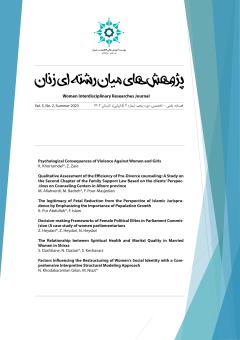Qualitative Assessment of the Efficiency of Pre-Divorce counseling: A Study on the Second Chapter of the Family Support Law Based on the clients’ Perspectives on Counseling Centers in Alborz province.
Subject Areas :Mehri Allahverdi 1 , Mohsen Badre 2 , Fatemeh Pour-masjedian 3
1 - Master's graduate in Women's Studies from Alzahra University.
2 - Assistant professor and faculty member of the Department of Family and Women's Studies, Alzahra University.
3 - Assistant professor and faculty member of the Law Department, Faculty of Social Sciences and Economics, Alzahra University.
Keywords: Family, Divorce, Pre-divorce counseling, Family counseling.,
Abstract :
The legislator, by instituting pre-divorce counseling, aimed to address unnecessary divorces under the second chapter of the Family Support Law in 2013. This paper presents a qualitative assessment of the effectiveness of this counseling based on the perspectives of couples who have undergone all stages of pre-divorce counseling. The research methodology employed phenomenology, with thematic analysis is used to analyze the interviews. The fifteen interviewees were residents of Alborz province, selected through purposive sampling. Six main themes emerged from the interview analysis: the provision of necessary solutions by the counselor, fostering compromise and continuity in marital life, seeking legal and social guidance from counselors, the impactful nature of timely counseling, the lack of effectiveness of counseling sessions in fostering compromise, and the drawbacks of the current pre-divorce counseling process. The interviewees generally unanimous in their expectation from the counseling that the counselor can create a compromise between couples, however, their attitudes toward the effectiveness of current counseling indicate dissatisfaction. This lack of satisfaction encompasses different dimensions, including the heavy costs of consultation fees and the lack of government coverage, the inappropriate timing of counseling sessions, some counselors underestimating the importance of family consolidation, and insufficient efforts to mend couples' relationships. Additionally, interviewees noted a lack of adequate expertise and experience among counselors, along with gender biases exhibited by some counselors. This research suggests a revision of the second chapter of the Family Support Law to align with the legislator's goal and eliminate the disadvantages of the current shortcomings, ultimately enhancing the efficacy of mandatory pre-divorce counseling for couples.
1- اکبری، زهرا؛ و شریعتمدار، آسیه؛ فرحبخش، کیومرث، و نظری، علی محمد(1401). طراحی مدل صلاحیتهای حرفهای مشاوران طلاق مراکز مداخله در بحران. فرهنگ مشاوران و روان¬درمانی، 13(49)، 31-76. doi:10.22054/qccpc.2021.62949.2770
2- بیگدلی، الیاس؛ فرحبخش، کیومرث؛ سلیمی بجستانی، حسین؛ معتمدی شلمزاری، عبدالله؛ و الهی، طاهره(1399). فراهم آوری و ارزیابی اثربخشی دستنامۀ توانگر سازی مشاورین طلاق بر پایۀ آسیبشناسی مشاورههای طلاق در سازش درخواستکنندگان طلاق. مشاوره و رواندرمانی خانواده، 10(1)، 237-270. 10.22034/FCP.2020.61747doi
3- کرسول، جان(۱۳۹۸). کیفی و طرح پژوهش انتخاب از میان پنج رویکرد (روایت پژوهی، پدیدارشناسی، نظریه داده بنیاد، قومنگاری، مطالعه موردی) (ویرایش دوم). ترجمه حسن داناییفرد و حسین کاظمی. تهران: صفار.
4- جعفری لنگرودی، محمد جعفر(1394). ترمینولوژی حقوق. تهران: انتشارات گنج دانش.
5- حاجی¬محمدی یزدی، حجت؛ و افراسیابی، حامد(1401). بررسی شیوه¬های نوین صلح و سازش در بین زوجین در مراکز مشاوره خانواده. اولین همایش ملی تحولات قانونگذاری در زمینه استحکام خانواده و مدیریت اختلافات، دامغان.
6- حیاتی، مژگان(1399). مشاوره طلاق. تهران: نشر دانژه.
7- خاکی، احمد(1396). تدوین مدل آموزش زوجدرمانی بومشناختی به مشاوران و تعیین اثربخشی آن بر کاهش میل به طلاق زوجهای ارجاعی به دادگستری در استان مرکزی. رساله دکترا دانشگاه علامه طباطبایی.
8- دادفر، محبوبه(1397). روانشناسی قانونی: ضرورتی در نظام عدالت کیفری ایران. پیشرفت¬های نوین در علوم رفتاری، 3(26)، 42-82.
9- زهراکار، کیانوش(1397). مشاوره خانواده (مفافیم، تاریخچه، فرآیند و نظریهها). تهران: ارسباران.
10- شفیع¬آبادی، عبدالله(۱۳۹۳). روشها و فنون مشاوره (مصاحبه بالینی). تهران: کتاب فکر نو.
11- شفیع¬آبادی، عبدالله؛ و ناصری، غلامرضا(۱۳۷۱). نظریههای مشاوره و رواندرمانی. تهران: مرکز نشر دانشگاهی.
12- جی ترال، تیموتی؛ و پرینستین، میچل جی(۱۳۹۰). روانشناسی بالینی. ترجمه مهرداد فیروزبخت. تهران: انتشارات رشد.
13- قورچی¬بیگی، مجید؛ و اقبالی، ابوالفضل(1399). ساخت اجتماعی طلاق توافقی در ایران. خانواده پژوهی، 16(61)، 97-114.
14- کیوی، ریموند؛ و کامپنهود، لوک¬وان(1395). روش تحقیق در علوم اجتماعی. ترجمه عبدالحسین نیک¬گهر. تهران: توتیا.
15- گوانبرگ، هربرت؛ و گولدنبرگ، آیرین(1397). خانوادهدرمانی. ترجمه مهرداد فیروزبخت. تهران: موسسه خدمات فرهنگی رسا.
16- محمدتقیزاده، مهدیه(1398). تجربه مشاوره اجباری بین متقاضیان طلاق توافقی در شهر تهران. پژوهشنامه زنان، 11(31)، 83-112. 10.30465/WS.2020.5103doi:
17- وطندوست، علی؛ و حسین¬زاده، محمد(1398). اثربخشی مشاوره در سازش یا عدم سازش زوجین مراجعهکننده به مراکز طلاق در استان مازندران 1397. پنجمین کنفرانس بینالمللی پژوهش در روانشناسی، مشاوره و علوم تربیتی.
18- Eurofound. (2012). The European Foundation for the Improvement of Living and Working Conditions. EurLife, Population and society: Divorce rate. Retrieved from http://www.eurofound.europa.eu/areas/qualityoflife/eurlife/
19- Eurostat. (2012). European statistics for the European Commission, Population and social conditions: Divorces. Retrieved from http://epp.eurostat.ec.europa.eu
20- Kin, N. & Horrocks, C. (2010). Interviews in qualitative research. Sage, London.
21- King, N. (2004) Using Templates in Thematic Analysis of Text. In: Essential Guide to Qualitative Methods in Organizational Research, Sage Publications, London.


